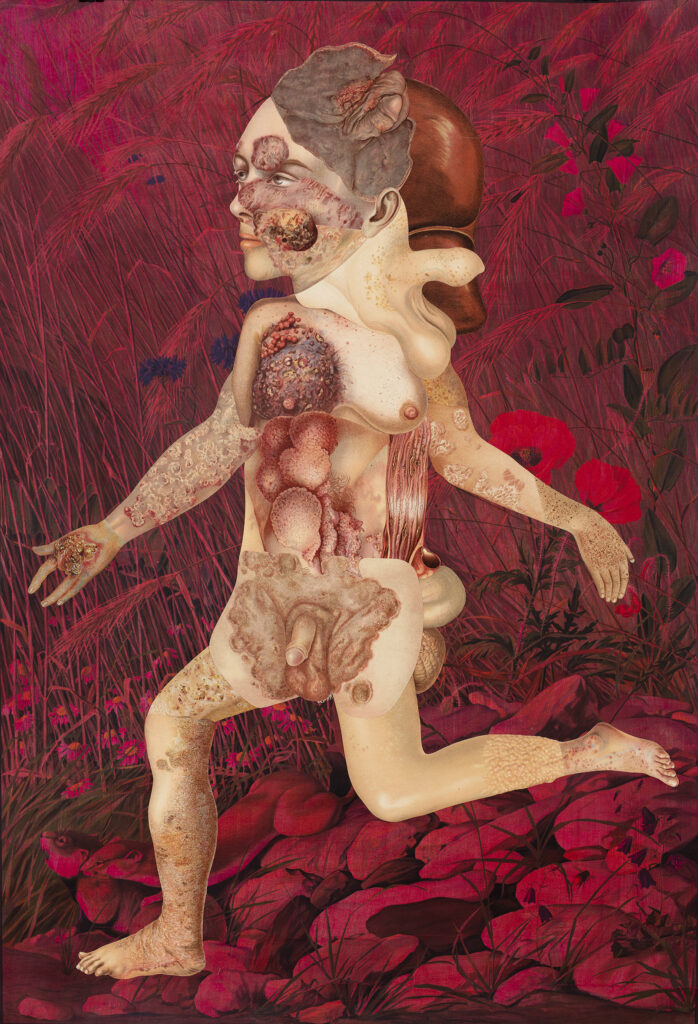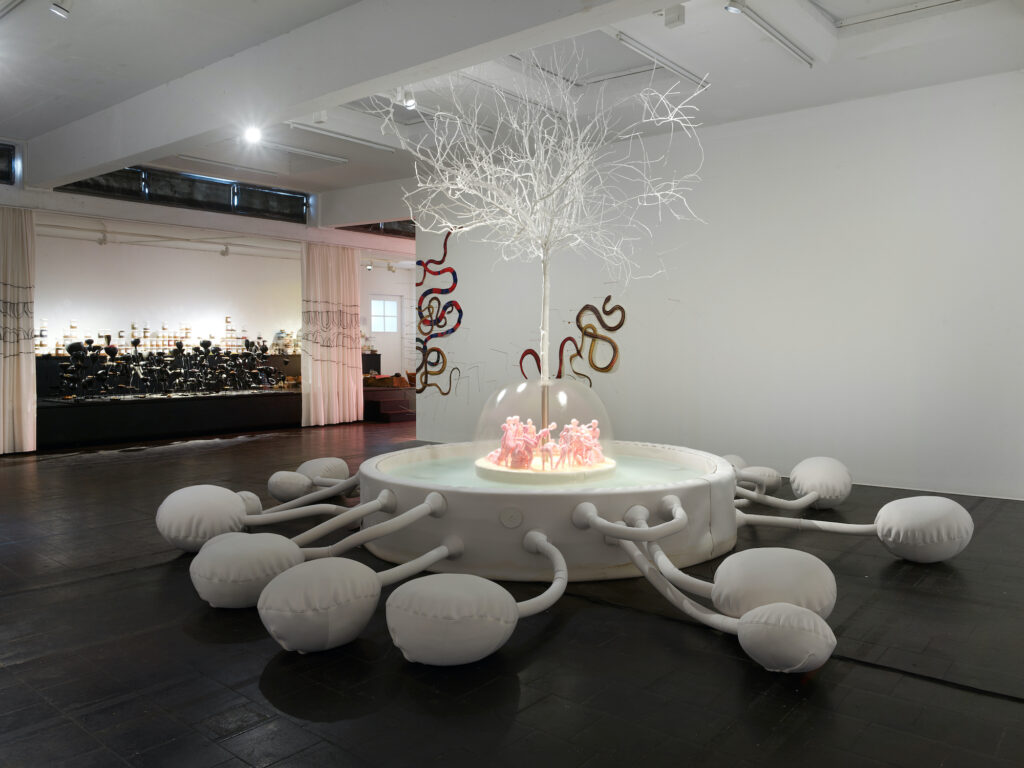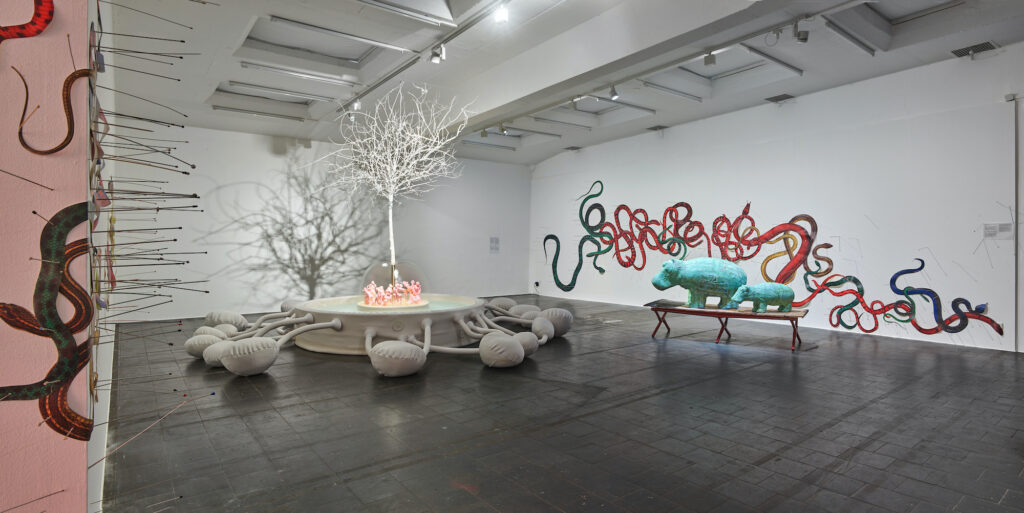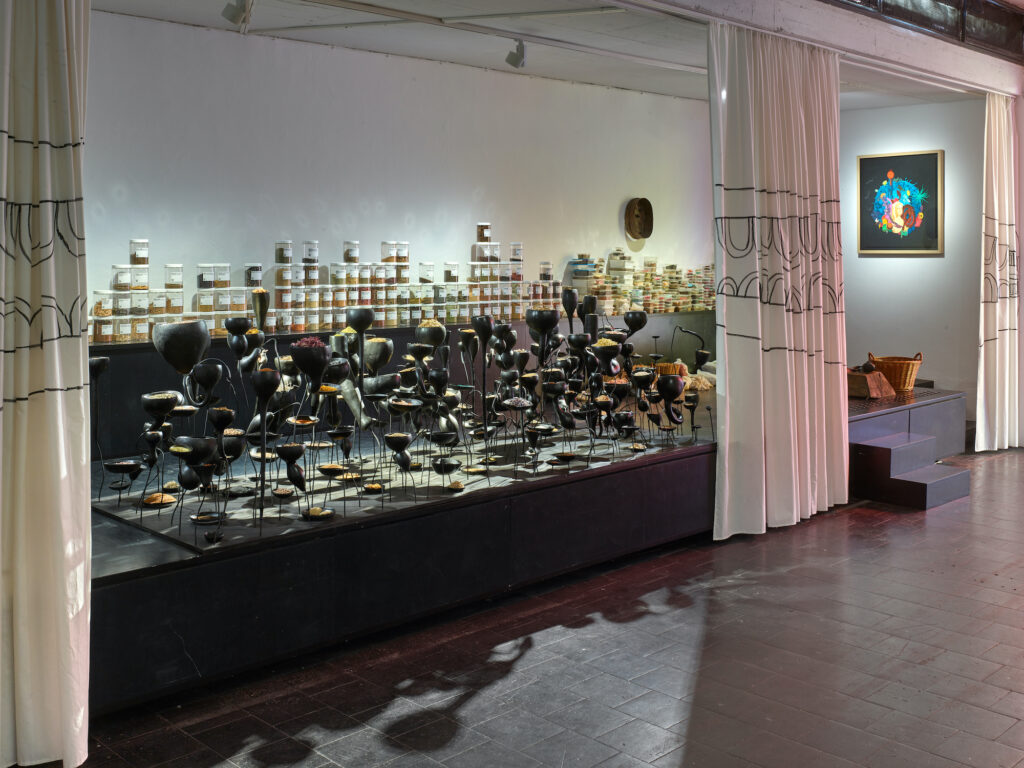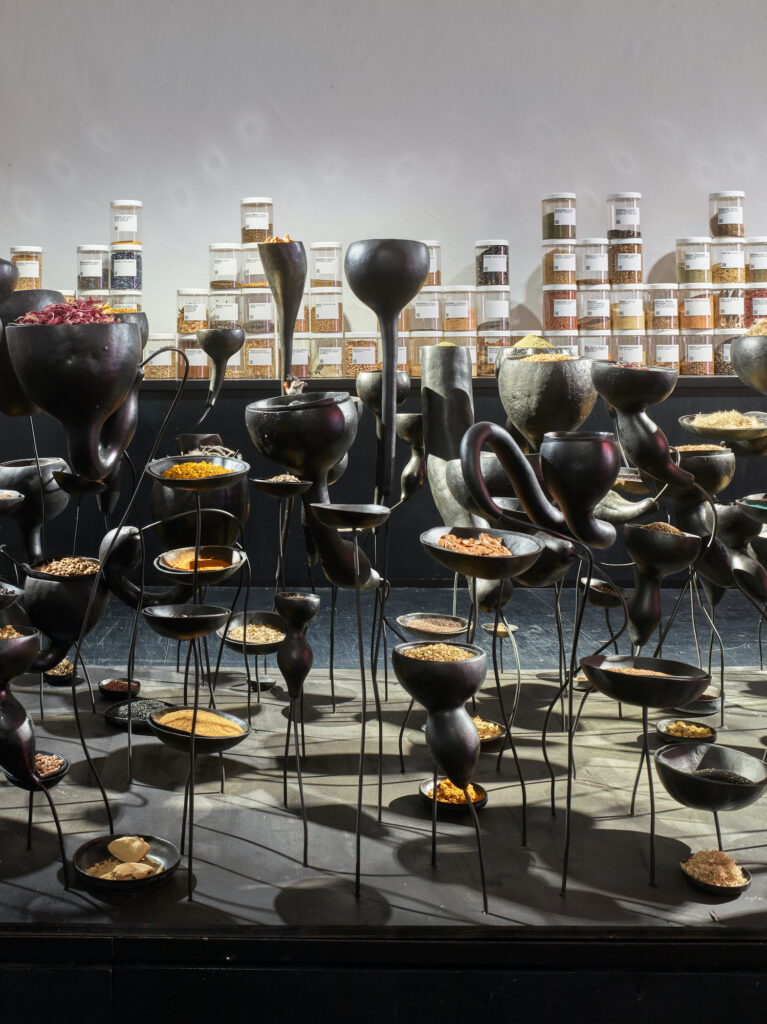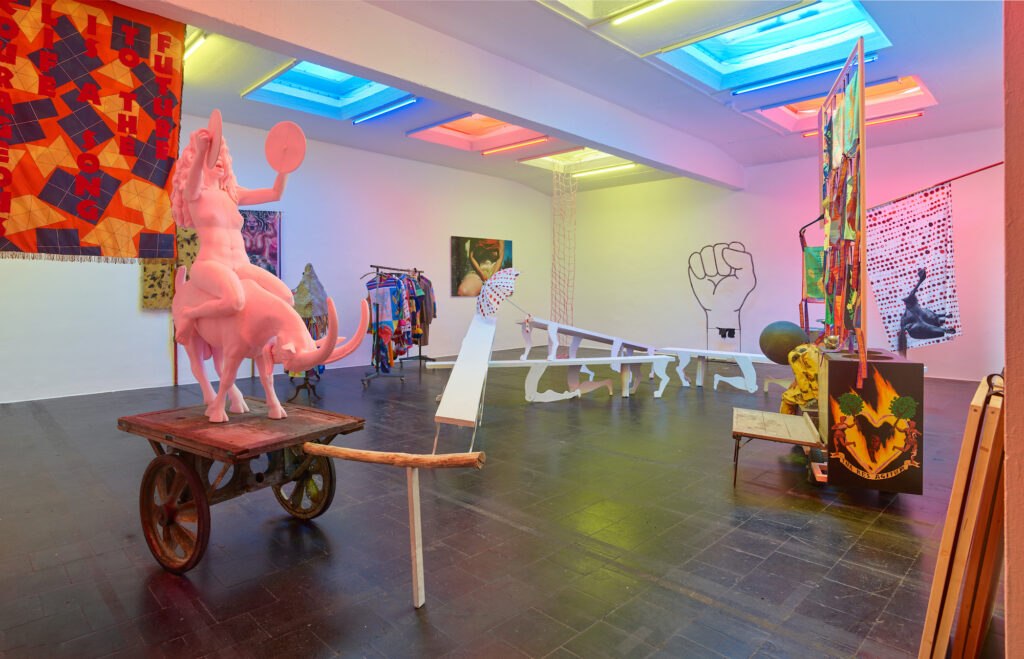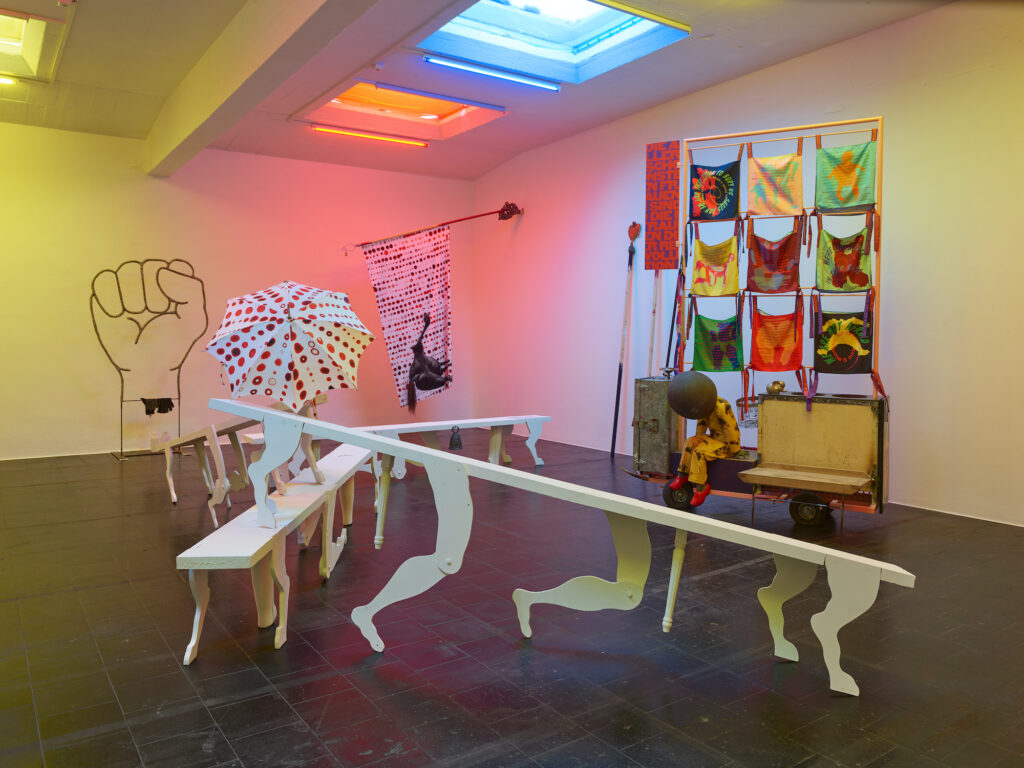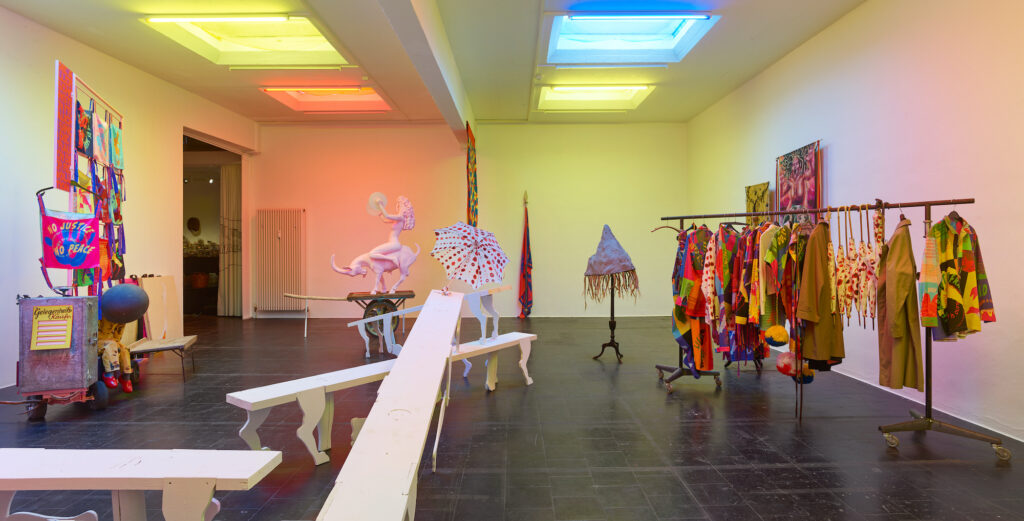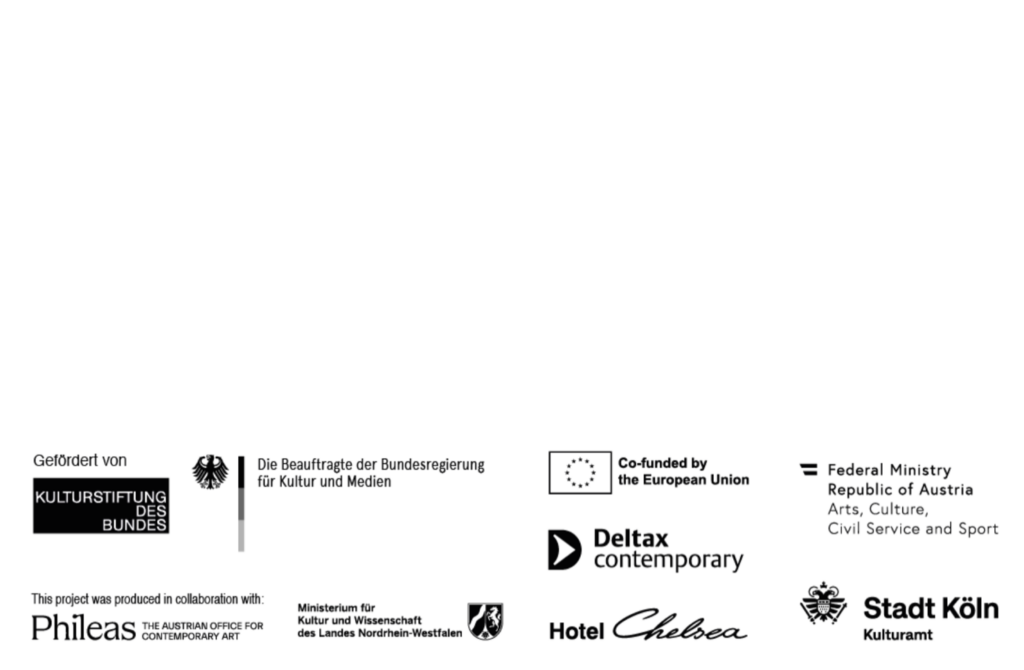EVERY COURAGEOUS LIFE IS A SONG TO THE FUTURE
Ines Doujak
30 September — 17 December 2023
Opening: Fri 29 September, 7 p.m.
In the beginning of her book Braiding Sweetgrass: Indigenous Wisdom, Scientific Knowledge, and the Teachings of Plants Robin Wall Kimmerer recalls the story of the Skywoman, shared by the Indigenous peoples throughout the Great Lakes region in North America. In the legend, the falling Skywoman is being carried down by a goose and lands on the back of a turtle. Where she lands is only darkness, water and water animals. A muskrat gives its life in order to bring her a small handful of mud which she spreads across the shell of the turtle. Moved by the generosity of the animals, the Skywoman begins to dance her gratitude and through that the land begins to grow. Then she spreads the seeds that she brought with her so that the animals have plenty to eat. As her fall creates a beam of light from the Skyworld, the plants can grow. The story of the Skywoman is a story of reciprocity—beneficial relations between different species. She is not Eve, banished from the garden for tasting a fruit and forced to subdue the natural world in order to survive. She is an ancestral gardener, an immigrant, a welcomed guest that wants to give back.
From a contemporary perspective, there is a feminist undertone to the whole myth and this is also what makes it a perfect introduction to the exhibition of Ines Doujak at the CCA Temporary Gallery in Cologne. The main inspiration for the exhibition was namely women land defenders from all over the world—activists who work to protect ecosystems and the human right to a safe and healthy environment. They are the ones facing the acceleration of the land grab with all its horrific effects: the disruption of working economies, monoculture farming, the destruction of the soil and diversity, and climate change. Many of these defenders, who have a sense of responsibility for a common future, are members of Indigenous communities in the Global South trying to protect their ancestral lands. Many are of older age, rather than younger people with “lives ahead of them.”
What is important to mention is that “women” are defined here as a political category including all those who suffer under the material conditions that have historically been assigned to women, as trans and nonbinary people, intersex and agender, and queer people. Máxima Acuña de Chaupe in Peru, Eva Bande in Indonesia, Bai Bibyaon Ligkayan Bigkay in the Pantaron Mountain Range, Joye Braun in North Dakota, Berta Cáceres in Honduras, Maria Chaverra in Colombia, Kateryna Handziuk in Ukraine, Sônía Guajajara in Brazil, Francia Márquez in Colombia, Wangari Muta Maathai in Kenya, Vanessa Nakate in Congo, and many others—the courage of these women land defenders, working in extremely difficult conditions, gives us hope and counters the dystopian worldview constantly imposed on us.
Contrary to what you might expect, the exhibition does not refer to the activist struggles in a direct, documentary way. It operates on another level, by returning to the sphere of the symbolic. The political inspiration translates here into a captivating, sensual environment drawing from different aesthetic and cultural traditions.
The central element of the exhibition is an artistic parade in public space on Saturday 28.10 called “The most beautiful women are the women of the revolution”, the goal of which is to express solidarity with women land defenders from all over the world. In the weeks after the exhibition opening, the space will host a series of meetings and workshops leading to this joint action. Finally, a communal body will be formed to counter the politics of indifference and despair and regain agency in seemingly hopeless times. Activist Jakeline Romero Epiayú, artist Camilo Pachón and curator Luiza Proença will contribute to the procession. The event is an act of internationalist solidarity based on the recognition that protecting the environment is inseparably related to political struggles against (post)colonial domination, structural racism, and misogynistic practices.
The exhibition is accompanied by a booklet with the curatorial text, a poem by Lynne Thompson and two book excerpts: from Malcom Ferdinand’s Decolonial Ecology: Thinking from the Caribbean World (2021) and Londa Schiebinger’s Plants and Empire: Colonial Bioprospecting in the Atlantic World (2004). A PDF of the booklet is available HERE.
The exhibition is curated by Mateusz Okoński and Aneta Rostkowska.
Exhibition design by Mateusz Okoński.
You can read the longer version of the curatorial text HERE.
Ines Doujak was born in Klagenfurt in 1959 and completed an apprenticeship as a carpenter in 1975. From 1988 to 1993 she studied at the University of Applied Arts in Vienna, where she received her diploma. She was project leader and key researcher of the two research projects “Loomshuttles, Warpaths” (2010–2018) and “Utopian Pulse – Flares in the Darkroom” (2013–2014) at the Vienna Secession, funded by the Austrian Science Fund FWF (PEEK). Ines Doujak has received several awards, including the City of Vienna Prize for Fine Arts (2007), the Cultural Prize of the State of Carinthia (2017) and the Austrian Art Prize (2022). Her works have been presented in solo exhibitions at the Vienna Secession (2002), the Salzburger Kunstverein (2005), Royal College of Art, London (2013), Württembergischer Kunstverein, Stuttgart (2016), Bunkier Sztuki Gallery of Contemporary Art, Kraków (2017), Lentos Kunstmuseum Linz (2018) or the Kunsthalle Wien (2021) and have been featured in group exhibitions in institutions such as the Museo Nacional Centro de Arte Reina Sofía, Madrid (2010), the MACBA, Barcelona (2015), the Lentos Museum, Linz ( 2018), Museum of Modern Art, Warsaw (2020), House of World Cultures, Berlin (2021). In addition, her work was represented at documenta 12 in Kassel (2007) and biennials such as the Busan Biennale, Korea (2012), the Bienal de São Paulo (2014), Bergen Assembly (2019) and the Liverpool Biennial (2021). In her projects Ines Doujak often collaborates with John Barker. The artist lives and works in Vienna.
Images:
Ines Doujak: Every courageous life is a song to the future, 2023, installation views.
Photos: Simon Vogel, Cologne
